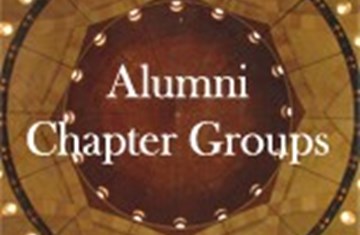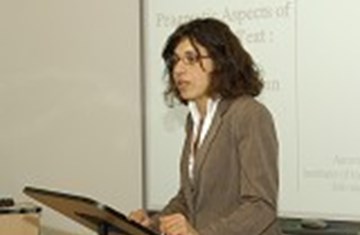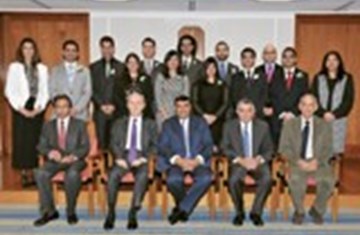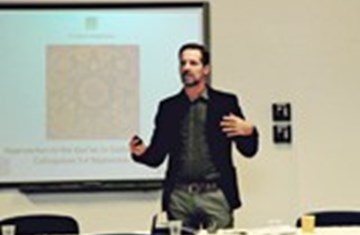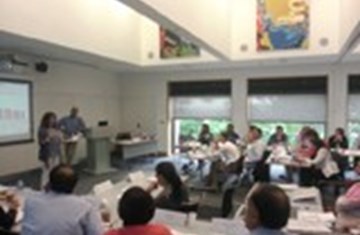IIS Alumni Academic Seminar focuses on Education and Faith Communities
The 2010 IIS Alumni Academic Seminar was held at the Ismaili Centre, Dubai, UAE from 4-6 December, 2010. Thirty-five alumni from Asia, Europe and North America, gathered to debate and discuss the theme of Education and Faith Communities: Issues and Responses. Sessions ranged from the philosophic to the practical, focusing on how religious education is understood, and the role that it can play in the larger society. The topic of the Academic Seminar was particularly pertinent as this was the first annual Academic Seminar that included graduates of the Institute’s Secondary Teacher Education Program (STEP) as well as other IIS alumni working as educators around the world.
Mr Shiraz Kabani, Head of Operations, Finance & Development at IIS, opened the seminar with some introductory words delineating the programme objectives and highlighting the key issues and challenges relevant to religious education within the context of faith-based communities.
Professor John Hull delivered the first session reflecting on the relationship between Christian theology and religious education. In particular, he drew parallels between different teaching processes and applied Christian theology. In his view, religious education should not be approached through an exposition of theological (Christian or otherwise) principles alone; rather it should be approached through a critical examination of the actual context in which education takes place so as to avoid becoming only a process of indoctrination.
He further argued that if teachers of religious education are first and foremost educators, they must be open to the possibility that their students may or may not accept what they are taught. In order for religious education to be of use in the modern world, it must encourage faith in the context of known and understood alternatives.
Dr Anil Khamis (Class of 1992) discussed religious education in the context of developing countries, particularly focusing on the case study of Somalia and the Dar al-Qur’an school model. This transnational initiative, supported by diasporic communities, combines the attractions of a modern school (the built environment, trained teachers, etc.) with the aspirations of communities in terms of their religious needs. Dr Khamis introduced the debate between two different understandings of the purpose of schools and religious education: schools as sites to learn how to be in society and schools as sites of insulation from society until children are intellectually equipped.
On the second day of the seminar, Professor Liam Gearon discussed the interrelation of religion, politics and education in his paper on “State Policies on Religion in Education and the Position of Faith Communities”. Professor Gearon’s provocative thesis was that liberal democracies risk veering towards autocracy by attempting to control culture. Tracing philosophies of education from the Enlightenment onward, Professor Gearon used historical analysis to discuss how contemporary secular liberal democracies are inheritors of both the enlightenment tradition and totalitarian experiences.
Although in the past civics education ignored the role of religion in society, today teaching religion has become understood as a national security issue. In his view, state policies today neglect liberal democracy’s self-critique, and instead, increasingly use religion for political purposes. Today’s “counter-terrorism classroom” requires students to participate in an autocratic disavowal of discourse beyond the foundational terms of citizenship, democracy and human rights. This framework is therefore no less totalizing than the structures of theologies that it seeks to replace.
In the final session, Dr Abdulkader Tayob considered the relationship between ethics, moral reasoning and religious education. Dr Tayob began from the context of Apartheid South Africa, discussing various Muslim responses to ethical questions in the modern world. After the end of the Ottoman Caliphate in 1924, the redefinition of politics in Muslim societies became the intellectual ground for new ideas about identity, state, change, gender, etc.
Particularly focusing on human rights and Islamic law, Dr Tayob concluded that the texts of the Islamic tradition are relevant resources, even if they do not contain answers to contemporary questions per se. Furthermore, the desire to “correct” negative portrayals of Islam is wrapped up in very modern notions of identity that should be interrogated rather than simply accepted.
Discussions on both days were facilitated by Dr Shiraz Thobani (Class of 1982), Research Associate, and Dr Farouk Mitha (Class of 1986), Academic Course Director for STEP, both at the IIS. Both of them, in collaboration with Dr. Farid Panjwani of AKU-ISMC (Class of 1997), also contributed to the conceptualisation of the academic seminar. In addition to substantive sessions, alumni also enjoyed a tour of the Ismaili Centre, dinner on a replica of the traditional Dhow, and a visit to the Sharjah Museum of Islamic Civilization.

